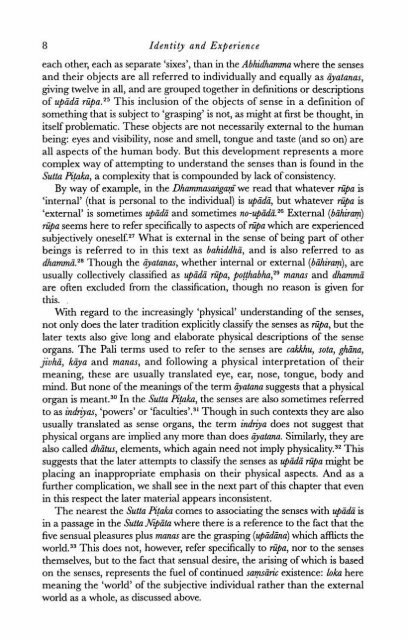Identity and Experience_Hamilton_1996
Identity and Experience_Hamilton_1996
Identity and Experience_Hamilton_1996
Create successful ePaper yourself
Turn your PDF publications into a flip-book with our unique Google optimized e-Paper software.
8 <strong>Identity</strong> <strong>and</strong> <strong>Experience</strong><br />
each other, each as separate 'sixes', than in the Abhidhamma where the senses<br />
<strong>and</strong> their objects are all referred to individually <strong>and</strong> equally as eatanas,<br />
giving twelve in all, <strong>and</strong> are grouped together in definitions or descriptions<br />
of upid5 rii~a.~~ This inclusion of the objects of sense in a definition of<br />
something that is subject to 'grasping' is not, as might at first be thought, in<br />
itself problematic. These objects are not necessarily external to the human<br />
being: eyes <strong>and</strong> visibility, nose <strong>and</strong> smell, tongue <strong>and</strong> taste (<strong>and</strong> so on) are<br />
all aspects of the human body. But this development represents a more<br />
complex way of attempting to underst<strong>and</strong> the senses than is found in the<br />
Sutta Pi~ka, a complexity that is compounded by lack of consistency.<br />
By way of example, in the Dhammasangapiwe read that whatever riipa is<br />
'internal' (that is personal to the individual) is upidi, but whatever riipa is<br />
'external' is sometimes upidi <strong>and</strong> sometimes no-~pidi.~~ External (bihiram)<br />
riipa seems here to refer specifically to aspects of n2pa which are experienced<br />
subjectively oneselE2' What is external in the sense of being part of other<br />
beings is referred to in this text as bahiddhi, <strong>and</strong> is also referred to as<br />
&ammi.28 Though the gatanas, whether internal or external (bcihiram), are<br />
usually collectively classified as upidi Gpa, ~otthabha,~~ manas <strong>and</strong> dhammi<br />
are often excluded from the classification, though no reason is given for<br />
this. ,<br />
With regard to the increasingly 'physical' underst<strong>and</strong>ing of the senses,<br />
not only does the later tradition explicitly classify the senses as riipa, but the<br />
later texts also give long <strong>and</strong> elaborate physical descriptions of the sense<br />
organs. The Pali terms used to refer to the senses are cakWlu, sota, ghina,<br />
jivh5, kiiya <strong>and</strong> manas, <strong>and</strong> following a physical interpretation of their<br />
meaning, these are usually translated eye, ear, nose, tongue, body <strong>and</strong><br />
mind. But none of the meanings of the term ciyatana suggests that a physical<br />
organ is meant.30 In the Sutta maka, the senses are also sometimes referred<br />
to as indnyas, 'powers' or 'fa~ulties'.~' Though in such contexts they are also<br />
usually translated as sense organs, the term indriya does not suggest that<br />
physical organs are implied any more than does Qatana. Similarly, they are<br />
also called &itus, elements, which again need not imply phy~icality.~~ This<br />
suggests that the later attempts to classify the senses as upid5 riipa might be<br />
placing an inappropriate emphasis on their physical aspects. And as a<br />
further complication, we shall see in the next part of this chapter that even<br />
in this respect the later material appears inconsistent.<br />
The nearest the Sutta Pi!aka comes to associating the senses with upi& is<br />
in a passage in the Sutta N$ita where there is a reference to the fact that the<br />
five sensual pleasures plus manas are the grasping (upidina) which afflicts the<br />
This does not, however, refer specifically to n2pa, nor to the senses<br />
themselves, but to the fact that sensual desire, the arising of which is based<br />
on the senses, represents the fuel of continued sapiric existence: loka here<br />
meaning the 'world' of the subjective individual rather than the external<br />
world as a whole, as discussed above.


